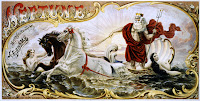I discovered the wonderful Ian Mortimer recently through an interview with Medievalists.net. Mortimer writes popular history in non-traditional formats (such as a daybook and traveller's guide):
"There are, of course, those who argue ... that we cannot presume that people in the past were anything like us. But such a line of argument is both self-defeating and false. It is false because, if we deny the humanity of the past, then we cease to study history, for history is specifically the history of our species – the past of uninhabited islands and other species belongs to other areas of enquiry."
"A succinct way of illustrating the difference is to say that I am studying humanity over time (then and now) whereas traditional academics study evidence from the past."Pin It




